仁爱版八年级英语下册Unit 8 Our Clothes Topic 2 We can design our own uniforms.复习课件(共27张PPT)
文档属性
| 名称 | 仁爱版八年级英语下册Unit 8 Our Clothes Topic 2 We can design our own uniforms.复习课件(共27张PPT) |
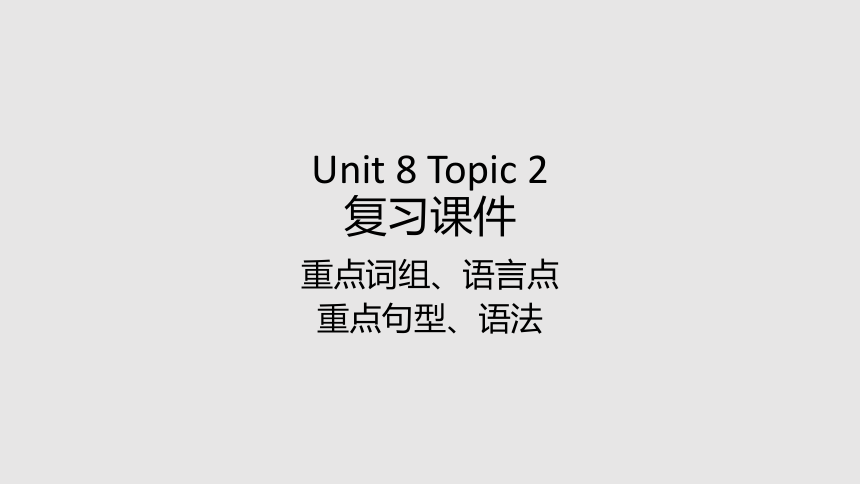
|
|
| 格式 | zip | ||
| 文件大小 | 92.6KB | ||
| 资源类型 | 教案 | ||
| 版本资源 | 仁爱科普版 | ||
| 科目 | 英语 | ||
| 更新时间 | 2020-04-12 14:43:38 | ||
图片预览


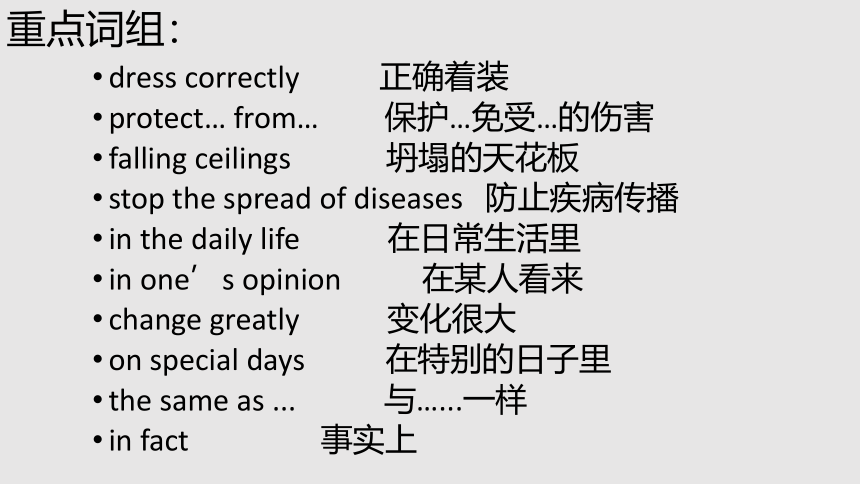
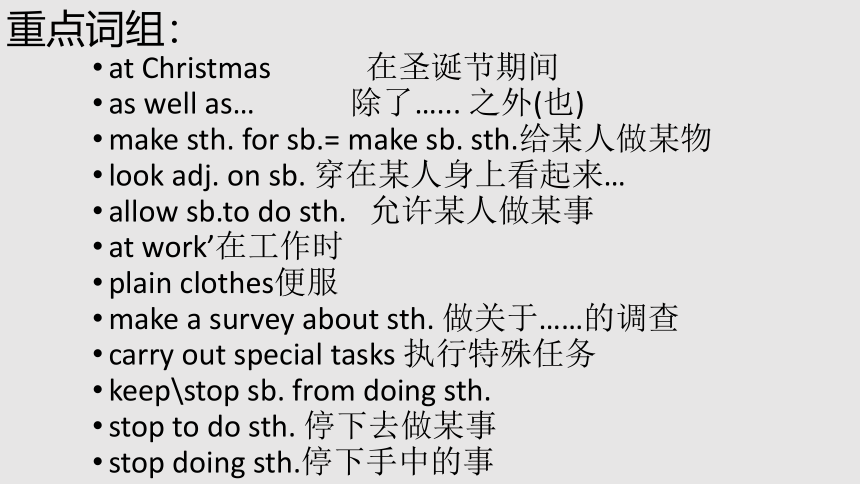
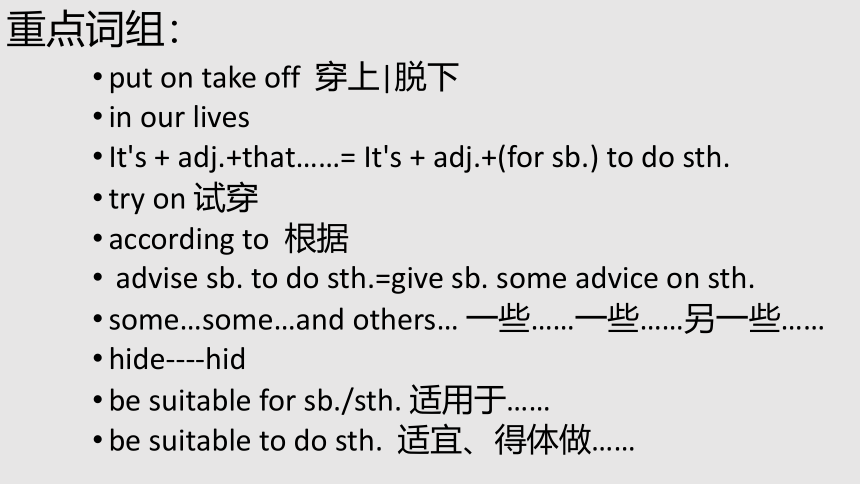
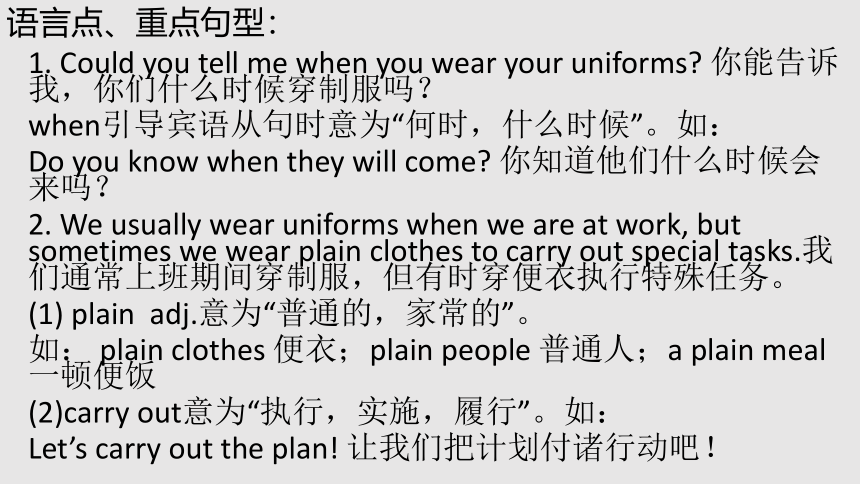
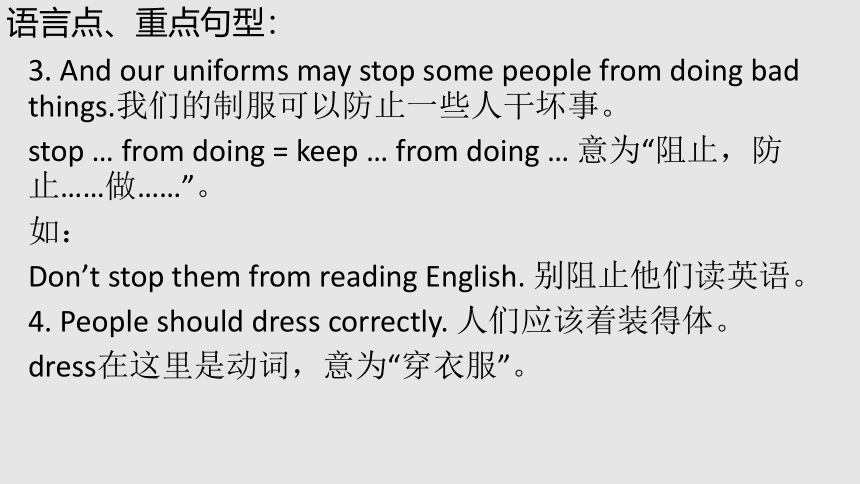
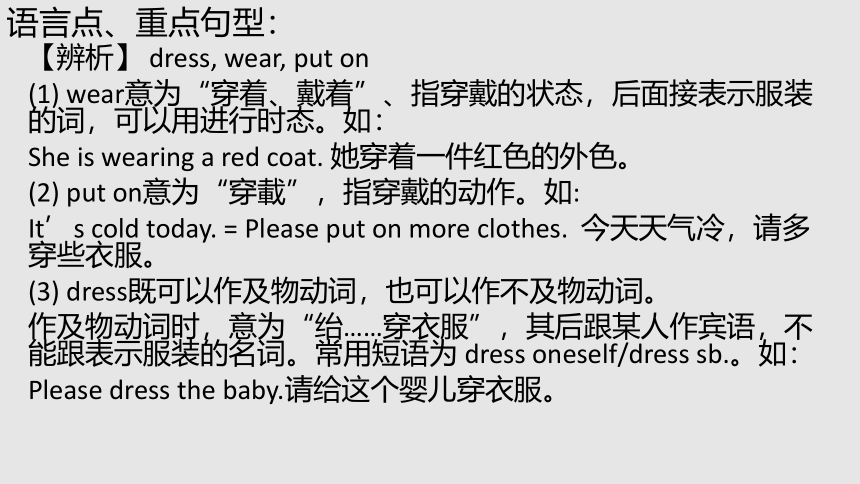
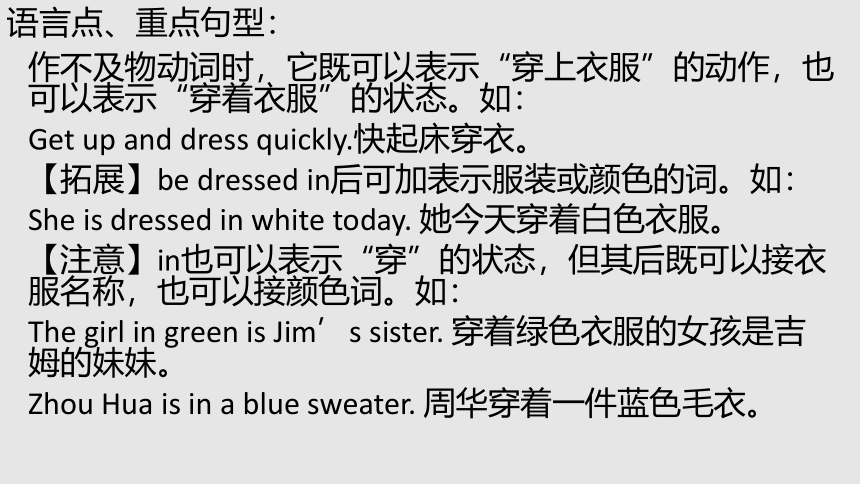
文档简介
(共27张PPT)
Unit 8 Topic 2
复习课件
重点词组、语言点
重点句型、语法
重点词组:
make uniforms for you 给你们定做校服
depend on 取决于、依赖
design uniforms 设计校服
show good discipline 展示良好的风纪
plain clothes 便衣
carry out special tasks 执行特殊任务
in trouble 处于困境中
stop sb. from doing sth. 阻止某人做某事
take off 脱下、起飞
on every occasion 在每个场合
重点词组:
dress correctly 正确着装
protect… from… 保护…免受…的伤害
falling ceilings 坍塌的天花板
stop the spread of diseases 防止疾病传播
in the daily life 在日常生活里
in one’s opinion 在某人看来
change greatly 变化很大
on special days 在特别的日子里
the same as ... 与…...一样
in fact 事实上
重点词组:
at Christmas 在圣诞节期间
as well as… 除了…... 之外(也)
make sth. for sb.= make sb. sth.给某人做某物
look adj. on sb. 穿在某人身上看起来…
allow sb.to do sth. 允许某人做某事
at work’在工作时
plain clothes便服
make a survey about sth. 做关于……的调查
carry out special tasks 执行特殊任务
keep\stop sb. from doing sth.
stop to do sth. 停下去做某事
stop doing sth.停下手中的事
重点词组:
put on take off 穿上|脱下
in our lives
It's + adj.+that……= It's + adj.+(for sb.) to do sth.
try on 试穿
according to 根据
advise sb. to do sth.=give sb. some advice on sth.
some…some…and others… 一些……一些……另一些……
hide----hid
be suitable for sb./sth. 适用于……
be suitable to do sth. 适宜、得体做……
语言点、重点句型:
1. Could you tell me when you wear your uniforms? 你能告诉我,你们什么时候穿制服吗?
when引导宾语从句时意为“何时,什么时候”。如:
Do you know when they will come? 你知道他们什么时候会来吗?
2. We usually wear uniforms when we are at work, but sometimes we wear plain clothes to carry out special tasks.我们通常上班期间穿制服,但有时穿便衣执行特殊任务。
(1) plain adj.意为“普通的,家常的”。
如: plain clothes 便衣;plain people 普通人;a plain meal 一顿便饭
(2)carry out意为“执行,实施,履行”。如:
Let’s carry out the plan! 让我们把计划付诸行动吧!
语言点、重点句型:
3. And our uniforms may stop some people from doing bad things.我们的制服可以防止一些人干坏事。
stop … from doing = keep … from doing … 意为“阻止,防止……做……”。
如:
Don’t stop them from reading English. 别阻止他们读英语。
4. People should dress correctly. 人们应该着装得体。
dress在这里是动词,意为“穿衣服”。
语言点、重点句型:
【辨析】 dress, wear, put on
(1) wear意为“穿着、戴着”、指穿戴的状态,后面接表示服装的词,可以用进行时态。如:
She is wearing a red coat. 她穿着一件红色的外色。
(2) put on意为“穿載”,指穿戴的动作。如:
It’s cold today. = Please put on more clothes. 今天天气冷,请多穿些衣服。
(3) dress既可以作及物动词,也可以作不及物动词。
作及物动词时,意为“绐……穿衣服”,其后跟某人作宾语,不能跟表示服装的名词。常用短语为 dress oneself/dress sb.。如:
Please dress the baby.请给这个婴儿穿衣服。
语言点、重点句型:
作不及物动词时,它既可以表示“穿上衣服”的动作,也可以表示“穿着衣服”的状态。如:
Get up and dress quickly.快起床穿衣。
【拓展】be dressed in后可加表示服装或颜色的词。如:
She is dressed in white today. 她今天穿着白色衣服。
【注意】in也可以表示“穿”的状态,但其后既可以接衣服名称,也可以接颜色词。如:
The girl in green is Jim’s sister. 穿着绿色衣服的女孩是吉姆的妹妹。
Zhou Hua is in a blue sweater. 周华穿着一件蓝色毛衣。
语言点、重点句型:
5. It’s suitable (for us) to wear business suits in a meeting.(对于我们来说)开会时穿西装是合适的。
句型 It’s + adj. + ( for sb. ) to do sth.意为“(某人)干某事是……”,可以转换为一个用it作形式主语的复合句结构。
It’s + adj. + that… ”。如:
It’s suitable that we wear business suits in a meeting.
【链接】类似的用法还有:
It’s necessary/important/well-known/ possible/ wonderful to do sth.意为“做某事是必要的/重要的/所周知的/可能的/极好的”。如:
It’s important to save water.节约用水很重要。
语言点、重点句型:
6. Firefighters wear special coats and helmets to protect themselves from heat and falling ceilings.消防人员穿特制的外套、戴头盔是为了防止高温和坍塌的天花板伤害他们。
(1) protect sb. from sth.意为“保护某人免受某物的侵害”。如:
In the forest you should protect yourself from snakes.在森林里,你要防止毒蛇咬伤。
(2) heat 意为“热”。如:
He could feel the heat of the sun on his back. 他能感觉到太阳照射在背上的热气。
【拓展】heat v. 意为“加热,变热”。如:
Heal the oil and add the potatoes. 把油烧热后加入土豆。
语言点、重点句型:
7. What people wear depends on their likes and dislikes.人们穿什么取决于他们的喜好。
(1) what people wear是what引导的从句,在句中充当主语,谓语动词用第三人称单数形式。
(2) depend on意为“依靠,取决于”,常用的结构有depend on/upon sb./sth.。如:
The cost of mobile phones depends on different types.
手机的价格取决于不同的型号。
He knew he could depend upon her to deal with the situation.
他知道他可以依靠她来应付这种局面。
语言点、重点句型:
(3) like在句中可以作名词、介词和动词。like 在这里是名词,意为“喜好,爱好”,反义词为dislike, 常用复数形式。如:
Everyone has different likes and dislikes, so there are different ways to live. 大家都有各自不同的喜好,因此生活方式各不相同。
【拓展】 (l)like作介词,表示“像,相似”时,反义词为unlike。如:
Your coat is like mine. We have the same color and style.你的上衣像我的。我们的颜色和款式都一样。
(2) like作动词,意为“喜欢”,反义词为dislike,意为“不喜欢”。如:
I like playing basketball very much. 我非常喜欢打篮球。
I dislike being away from my family. 我不喜欢远离家人。
语言点、重点句型:
8. People in Canada and the United States usually wear suits to work in offices, as well as for more formal occasions, just as people do in China. 加拿大人和美国人像中国人一样,除了在更正式的场合外,在办公室上班时也穿西服。
(1) suit n.意为“一套(衣服),套装”。
【辨析】suit, clothes, clothing
①suit 一套衣服(包括coat上衣;jacket夹克衫;skirt 短裙;waistcoat 背心;trousers 裤子等)。如:
He is wearing a brown suit.他穿着一套棕色西装。
②clothes衣服,只有复数形式,没有单数形式,它统指“服装”,而不是一件衣服,不能与具体数词连用。比如不能说a clothes或six clothes,但可以说 these clothes或many clothes。表示一套衣服时我们用 a set/suit of clothes。
如: These clothes are new.这些衣服是新的。
语言点、重点句型:
clothes可与名词搭配,表示不同类的衣服。如:
sports clothes 运动服 baby clothes 婴儿装
③clothing是“衣服”的总称,为不可数名词,因此,其前不能直
接用a,其后也不能加s,只能用a piece of ... 或 an article of … 表示“一件”。 如:
An overcoat is a piece of/ an article of clothing. 大衣是一件衣服。
【拓展】cloth意为“布,织物,衣料”,是不可数名词。如:
I need a lot of cloth if I’m going to make a new dress.如果要做一件
新衣服,我需要很多布。
但表示特殊用途的布时,cloth是可数名词。如:
Do you have any clothes for cleaning the furniture?
你有擦家具的布吗?
语言点、重点句型:
(2)as well as在此意为“除……之外,还,也”,强调前者。如:
They sell books as well as newspapers.他们除了卖报也卖书。
【链接】①as well as还意为“和……一样好”。如:
He plays the piano as well as Jane does.他的钢琴弹得和简一样好。
②as well意同also/too,常放于句末。如:
He is a teacher, and a writer as well.他是教师,也是作家。
语言点、重点句型:
9. People in cities around the world wear quite clothes.全世界城里人着装非常相似。
similar adj.意为“相似的,像”。如:
We have very similar interests. 我们兴趣相仿。
【拓展】(1) be similar to sb./sth. 意为“与……相似”。如:
Your situation is similar to mine.你的处境与我的相似。
(2) be similar in 在……(方面)相似。如:
The two houses are similar in size. 这两座房子大小差不多。
重点语法:宾语从句
宾语从句是英语复合句中的其中非常重要的从句之一。它是用一
个句子做另一个句子的宾语,将这个句子叫做宾语从句。宾语从
句做介词或及物动词的宾语。现在从下列三个方面总结归纳如下:
一、引导词
A,由that 引导的陈述句性的宾语从句,在很多动词如say, think,
wish , hope, see, believe, agree, expect, hear , feel等动词后。连词
that只起连接作用,在从句中不做句子的成分,也无词汇意义,在
口语中常被省略,但在大多数情况下还是以不省为好,特别是在
笔语中。
例:I told him that he was wrong.
在think, believe, suppose, expect等动词引起的宾语从句中,有时谓
语尽管是否定意义,却不用否定形式,而将think 等动词变为否定
形式。
例:I don’t think you are right. (我认为你做的不对)
在许多带有复合宾语的句子中,that引导的宾语从句经常移到句子
的后面,而用it做形式宾语。
例:We think it wrong that he told a lie to everyone (我认为他向每一
个人撒谎是错误的)
重点语法:宾语从句
B,由连词if、 whether 引导的表示“是否…”的宾语从句。Whether, if 在从句中不做句子的成分,一般情况下,whether和if 可以替换。
例:I don’t know if/whether he will come tomorrow.
The teacher asked if/whether we had finished the experiment.
在介词后面的宾语从句中不用if引导
例:Everything depends on whether we have enough money。
宾语从句中有or not时不用if引导.
例:I don’t know whether the movie star will come or not.
和不定式连用作宾语时不用if引导.
例:Whether to go there or not hasn’t been decided.
重点语法:宾语从句
C,由wh-引导的宾语从句。连接代词who, whom, whose, what, which,和连接副
词when, where, why, how 等连接的宾语从句,它们在句中即有连接从句的作
用,又在句中充当句子的成分。
例:Do you know which film they are talking about? (which做定语)
I don’t know where he lives. (where 做地点状语)
重点语法:宾语从句
二,宾语从句的语序,
宾语从句的语序必须是陈述语序,既连接词+主语+谓语+其他成分
例:I believe that they will come soon.
He asked me whether I was a teacher.
They wanted to know what they can do for us.
重点语法:宾语从句
二,宾语从句的时态。
宾语从句的时态受主句的限制,
既:主句是一般现在时态,从句根据实际情况而定。
主句是一般过去时态,从句用相应的过去的时态。如果从句的动
作发生在主句之前,则从句要用过去完成时态。
重点语法:宾语从句
例:
1)She says that she is a student.
She said that she was a student.
2)She says that she will fly to Japan in a week.
She said that she would fly to Japan in a week.
3)She says that she has finished her homework already.
She said that she had finished her homework already.
4)She says that she can sing a song in English.
She said that she could sing a song in English.
重点语法:宾语从句
4)She says that she can sing a song in English.
She said that she could sing a song in English.
如果宾语从句说的是客观真理、自然现象或事实时,这时宾语从
句要用一般现在时态。
例:The teacher said that the earth goes round the sun.
He told me that Japan is an island country.
Could you tell me…是用来征询对方的意见,语气委婉,并不表示过去。
例:Could you tell me when we will visit the History Museum?
重点语法:宾语从句
注意事项:
由陈述句变成宾语从句时,要注意人称的变化。
例:She said: “I have been to England before.”
She said that she had been to England before.
She asked me: “Do you like maths?”
She asked me if I liked maths.
重点语法:宾语从句
宾语从句与简单句的交换。
由连接代词和连接副词引导的宾语从句,如果宾语从句的主语和
主句的主语是同一个人时,可以用“疑问词+不定式
”做宾语的简单句结构。
例:I don’t know what I should do next.
I don’t know what to do next.
He didn’t know where he would live.
He didn’t know where to live.
重点语法:宾语从句
Unit 8 Topic 2
复习课件
重点词组、语言点
重点句型、语法
重点词组:
make uniforms for you 给你们定做校服
depend on 取决于、依赖
design uniforms 设计校服
show good discipline 展示良好的风纪
plain clothes 便衣
carry out special tasks 执行特殊任务
in trouble 处于困境中
stop sb. from doing sth. 阻止某人做某事
take off 脱下、起飞
on every occasion 在每个场合
重点词组:
dress correctly 正确着装
protect… from… 保护…免受…的伤害
falling ceilings 坍塌的天花板
stop the spread of diseases 防止疾病传播
in the daily life 在日常生活里
in one’s opinion 在某人看来
change greatly 变化很大
on special days 在特别的日子里
the same as ... 与…...一样
in fact 事实上
重点词组:
at Christmas 在圣诞节期间
as well as… 除了…... 之外(也)
make sth. for sb.= make sb. sth.给某人做某物
look adj. on sb. 穿在某人身上看起来…
allow sb.to do sth. 允许某人做某事
at work’在工作时
plain clothes便服
make a survey about sth. 做关于……的调查
carry out special tasks 执行特殊任务
keep\stop sb. from doing sth.
stop to do sth. 停下去做某事
stop doing sth.停下手中的事
重点词组:
put on take off 穿上|脱下
in our lives
It's + adj.+that……= It's + adj.+(for sb.) to do sth.
try on 试穿
according to 根据
advise sb. to do sth.=give sb. some advice on sth.
some…some…and others… 一些……一些……另一些……
hide----hid
be suitable for sb./sth. 适用于……
be suitable to do sth. 适宜、得体做……
语言点、重点句型:
1. Could you tell me when you wear your uniforms? 你能告诉我,你们什么时候穿制服吗?
when引导宾语从句时意为“何时,什么时候”。如:
Do you know when they will come? 你知道他们什么时候会来吗?
2. We usually wear uniforms when we are at work, but sometimes we wear plain clothes to carry out special tasks.我们通常上班期间穿制服,但有时穿便衣执行特殊任务。
(1) plain adj.意为“普通的,家常的”。
如: plain clothes 便衣;plain people 普通人;a plain meal 一顿便饭
(2)carry out意为“执行,实施,履行”。如:
Let’s carry out the plan! 让我们把计划付诸行动吧!
语言点、重点句型:
3. And our uniforms may stop some people from doing bad things.我们的制服可以防止一些人干坏事。
stop … from doing = keep … from doing … 意为“阻止,防止……做……”。
如:
Don’t stop them from reading English. 别阻止他们读英语。
4. People should dress correctly. 人们应该着装得体。
dress在这里是动词,意为“穿衣服”。
语言点、重点句型:
【辨析】 dress, wear, put on
(1) wear意为“穿着、戴着”、指穿戴的状态,后面接表示服装的词,可以用进行时态。如:
She is wearing a red coat. 她穿着一件红色的外色。
(2) put on意为“穿載”,指穿戴的动作。如:
It’s cold today. = Please put on more clothes. 今天天气冷,请多穿些衣服。
(3) dress既可以作及物动词,也可以作不及物动词。
作及物动词时,意为“绐……穿衣服”,其后跟某人作宾语,不能跟表示服装的名词。常用短语为 dress oneself/dress sb.。如:
Please dress the baby.请给这个婴儿穿衣服。
语言点、重点句型:
作不及物动词时,它既可以表示“穿上衣服”的动作,也可以表示“穿着衣服”的状态。如:
Get up and dress quickly.快起床穿衣。
【拓展】be dressed in后可加表示服装或颜色的词。如:
She is dressed in white today. 她今天穿着白色衣服。
【注意】in也可以表示“穿”的状态,但其后既可以接衣服名称,也可以接颜色词。如:
The girl in green is Jim’s sister. 穿着绿色衣服的女孩是吉姆的妹妹。
Zhou Hua is in a blue sweater. 周华穿着一件蓝色毛衣。
语言点、重点句型:
5. It’s suitable (for us) to wear business suits in a meeting.(对于我们来说)开会时穿西装是合适的。
句型 It’s + adj. + ( for sb. ) to do sth.意为“(某人)干某事是……”,可以转换为一个用it作形式主语的复合句结构。
It’s + adj. + that… ”。如:
It’s suitable that we wear business suits in a meeting.
【链接】类似的用法还有:
It’s necessary/important/well-known/ possible/ wonderful to do sth.意为“做某事是必要的/重要的/所周知的/可能的/极好的”。如:
It’s important to save water.节约用水很重要。
语言点、重点句型:
6. Firefighters wear special coats and helmets to protect themselves from heat and falling ceilings.消防人员穿特制的外套、戴头盔是为了防止高温和坍塌的天花板伤害他们。
(1) protect sb. from sth.意为“保护某人免受某物的侵害”。如:
In the forest you should protect yourself from snakes.在森林里,你要防止毒蛇咬伤。
(2) heat 意为“热”。如:
He could feel the heat of the sun on his back. 他能感觉到太阳照射在背上的热气。
【拓展】heat v. 意为“加热,变热”。如:
Heal the oil and add the potatoes. 把油烧热后加入土豆。
语言点、重点句型:
7. What people wear depends on their likes and dislikes.人们穿什么取决于他们的喜好。
(1) what people wear是what引导的从句,在句中充当主语,谓语动词用第三人称单数形式。
(2) depend on意为“依靠,取决于”,常用的结构有depend on/upon sb./sth.。如:
The cost of mobile phones depends on different types.
手机的价格取决于不同的型号。
He knew he could depend upon her to deal with the situation.
他知道他可以依靠她来应付这种局面。
语言点、重点句型:
(3) like在句中可以作名词、介词和动词。like 在这里是名词,意为“喜好,爱好”,反义词为dislike, 常用复数形式。如:
Everyone has different likes and dislikes, so there are different ways to live. 大家都有各自不同的喜好,因此生活方式各不相同。
【拓展】 (l)like作介词,表示“像,相似”时,反义词为unlike。如:
Your coat is like mine. We have the same color and style.你的上衣像我的。我们的颜色和款式都一样。
(2) like作动词,意为“喜欢”,反义词为dislike,意为“不喜欢”。如:
I like playing basketball very much. 我非常喜欢打篮球。
I dislike being away from my family. 我不喜欢远离家人。
语言点、重点句型:
8. People in Canada and the United States usually wear suits to work in offices, as well as for more formal occasions, just as people do in China. 加拿大人和美国人像中国人一样,除了在更正式的场合外,在办公室上班时也穿西服。
(1) suit n.意为“一套(衣服),套装”。
【辨析】suit, clothes, clothing
①suit 一套衣服(包括coat上衣;jacket夹克衫;skirt 短裙;waistcoat 背心;trousers 裤子等)。如:
He is wearing a brown suit.他穿着一套棕色西装。
②clothes衣服,只有复数形式,没有单数形式,它统指“服装”,而不是一件衣服,不能与具体数词连用。比如不能说a clothes或six clothes,但可以说 these clothes或many clothes。表示一套衣服时我们用 a set/suit of clothes。
如: These clothes are new.这些衣服是新的。
语言点、重点句型:
clothes可与名词搭配,表示不同类的衣服。如:
sports clothes 运动服 baby clothes 婴儿装
③clothing是“衣服”的总称,为不可数名词,因此,其前不能直
接用a,其后也不能加s,只能用a piece of ... 或 an article of … 表示“一件”。 如:
An overcoat is a piece of/ an article of clothing. 大衣是一件衣服。
【拓展】cloth意为“布,织物,衣料”,是不可数名词。如:
I need a lot of cloth if I’m going to make a new dress.如果要做一件
新衣服,我需要很多布。
但表示特殊用途的布时,cloth是可数名词。如:
Do you have any clothes for cleaning the furniture?
你有擦家具的布吗?
语言点、重点句型:
(2)as well as在此意为“除……之外,还,也”,强调前者。如:
They sell books as well as newspapers.他们除了卖报也卖书。
【链接】①as well as还意为“和……一样好”。如:
He plays the piano as well as Jane does.他的钢琴弹得和简一样好。
②as well意同also/too,常放于句末。如:
He is a teacher, and a writer as well.他是教师,也是作家。
语言点、重点句型:
9. People in cities around the world wear quite clothes.全世界城里人着装非常相似。
similar adj.意为“相似的,像”。如:
We have very similar interests. 我们兴趣相仿。
【拓展】(1) be similar to sb./sth. 意为“与……相似”。如:
Your situation is similar to mine.你的处境与我的相似。
(2) be similar in 在……(方面)相似。如:
The two houses are similar in size. 这两座房子大小差不多。
重点语法:宾语从句
宾语从句是英语复合句中的其中非常重要的从句之一。它是用一
个句子做另一个句子的宾语,将这个句子叫做宾语从句。宾语从
句做介词或及物动词的宾语。现在从下列三个方面总结归纳如下:
一、引导词
A,由that 引导的陈述句性的宾语从句,在很多动词如say, think,
wish , hope, see, believe, agree, expect, hear , feel等动词后。连词
that只起连接作用,在从句中不做句子的成分,也无词汇意义,在
口语中常被省略,但在大多数情况下还是以不省为好,特别是在
笔语中。
例:I told him that he was wrong.
在think, believe, suppose, expect等动词引起的宾语从句中,有时谓
语尽管是否定意义,却不用否定形式,而将think 等动词变为否定
形式。
例:I don’t think you are right. (我认为你做的不对)
在许多带有复合宾语的句子中,that引导的宾语从句经常移到句子
的后面,而用it做形式宾语。
例:We think it wrong that he told a lie to everyone (我认为他向每一
个人撒谎是错误的)
重点语法:宾语从句
B,由连词if、 whether 引导的表示“是否…”的宾语从句。Whether, if 在从句中不做句子的成分,一般情况下,whether和if 可以替换。
例:I don’t know if/whether he will come tomorrow.
The teacher asked if/whether we had finished the experiment.
在介词后面的宾语从句中不用if引导
例:Everything depends on whether we have enough money。
宾语从句中有or not时不用if引导.
例:I don’t know whether the movie star will come or not.
和不定式连用作宾语时不用if引导.
例:Whether to go there or not hasn’t been decided.
重点语法:宾语从句
C,由wh-引导的宾语从句。连接代词who, whom, whose, what, which,和连接副
词when, where, why, how 等连接的宾语从句,它们在句中即有连接从句的作
用,又在句中充当句子的成分。
例:Do you know which film they are talking about? (which做定语)
I don’t know where he lives. (where 做地点状语)
重点语法:宾语从句
二,宾语从句的语序,
宾语从句的语序必须是陈述语序,既连接词+主语+谓语+其他成分
例:I believe that they will come soon.
He asked me whether I was a teacher.
They wanted to know what they can do for us.
重点语法:宾语从句
二,宾语从句的时态。
宾语从句的时态受主句的限制,
既:主句是一般现在时态,从句根据实际情况而定。
主句是一般过去时态,从句用相应的过去的时态。如果从句的动
作发生在主句之前,则从句要用过去完成时态。
重点语法:宾语从句
例:
1)She says that she is a student.
She said that she was a student.
2)She says that she will fly to Japan in a week.
She said that she would fly to Japan in a week.
3)She says that she has finished her homework already.
She said that she had finished her homework already.
4)She says that she can sing a song in English.
She said that she could sing a song in English.
重点语法:宾语从句
4)She says that she can sing a song in English.
She said that she could sing a song in English.
如果宾语从句说的是客观真理、自然现象或事实时,这时宾语从
句要用一般现在时态。
例:The teacher said that the earth goes round the sun.
He told me that Japan is an island country.
Could you tell me…是用来征询对方的意见,语气委婉,并不表示过去。
例:Could you tell me when we will visit the History Museum?
重点语法:宾语从句
注意事项:
由陈述句变成宾语从句时,要注意人称的变化。
例:She said: “I have been to England before.”
She said that she had been to England before.
She asked me: “Do you like maths?”
She asked me if I liked maths.
重点语法:宾语从句
宾语从句与简单句的交换。
由连接代词和连接副词引导的宾语从句,如果宾语从句的主语和
主句的主语是同一个人时,可以用“疑问词+不定式
”做宾语的简单句结构。
例:I don’t know what I should do next.
I don’t know what to do next.
He didn’t know where he would live.
He didn’t know where to live.
重点语法:宾语从句
同课章节目录
- Unit 5 Feeling excited
- Topic 1 You look excited
- Topic 2 I’m feeling better now.
- Topic 3 Many things can affect our feelings.
- Unit 6 Enjoying Cycling
- Topic 1 We're going on a three-day visit to Mount
- Topic 2 How about exploring Tian’anmen Square?
- Topic 3 Bicycle riding is good exercise.
- Unit 7 Food festival
- Topic 1 We’re preparing for a food festival.
- Topic 2 I’m not sure whether I can cook it well.
- Topic 3 I Cooked the Most Successfully
- Unit 8 Our Clothes
- Topic 1 We will have a class fashion show.
- Topic 2 We can design our own uniforms.
- Topic 3 He said the fashion show was wonderful.
